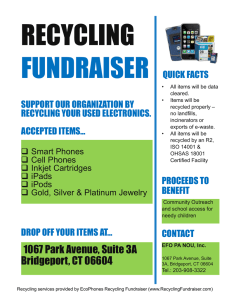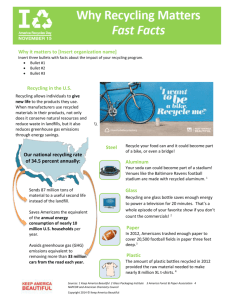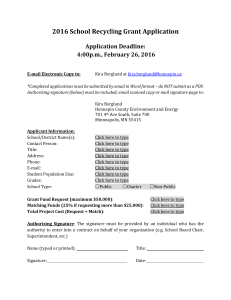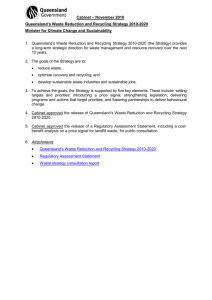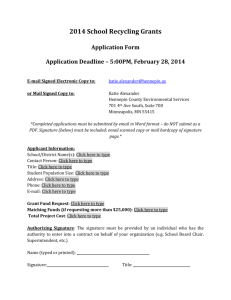School Recycling Grant Guidelines
advertisement
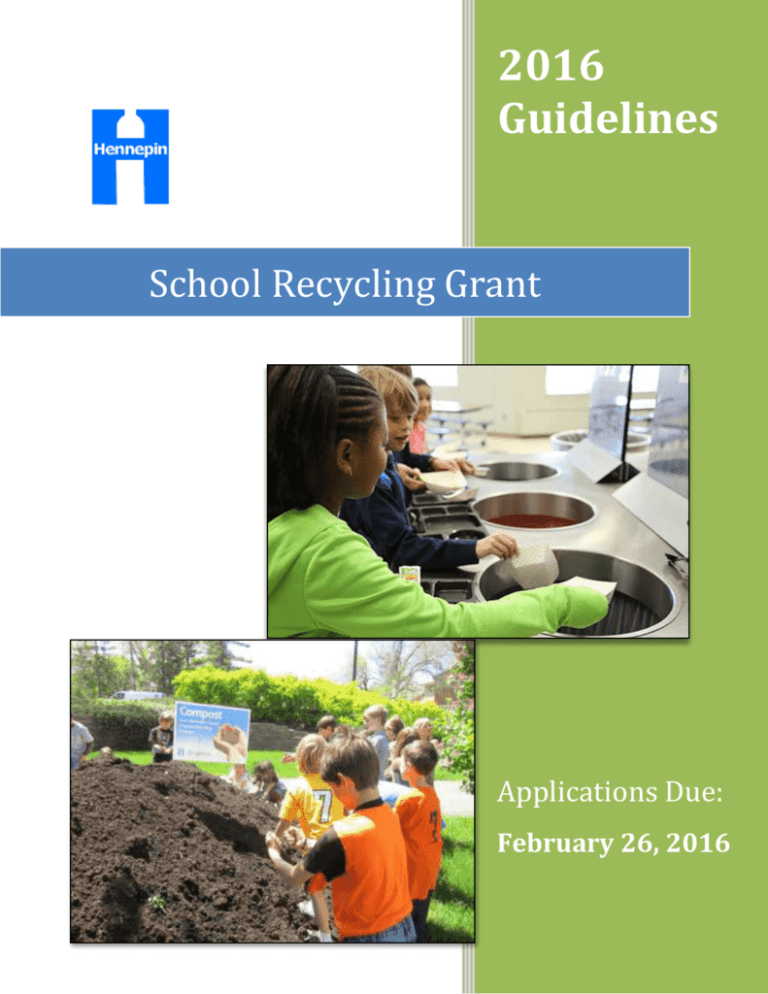
2016 Guidelines School Recycling Grant Applications Due: February 26, 2016 2016 School Recycling Grant - Guidelines I. Introduction The Hennepin County Board of Commissioners has established a Waste Abatement Incentive Fund (WAIF) for supporting waste reduction and recycling projects by local public entities and non-public K-12 schools in Hennepin County. The primary objective of this fund is to increase waste reduction, reuse, and recycling activities in the County. In 2012, a new grant program was developed with a focus solely on schools. Eligible recipients of funding from the School Recycling Assistance Program include both public and non-public K-12 schools in Hennepin County. In this grant round, up to $200,000 will be awarded to schools that meet the funding objectives and eligible expense requirements, as described in the following sections. Applications for funding are due by 4:00 p.m. on Friday February 26, 2016. The county will award funds based upon recommendations from a committee comprised of county staff and other experts on school waste abatement programs. Grant information sessions will be held on: Wednesday, January 27th at the Brookdale Library (6125 Shingle Creek Pkwy, Brooklyn Center) in Meeting Room C from 3:30-4:30p.m. Tuesday, February 2nd at the Ridgedale Public Library (12601 Ridgedale Dr, Minnetonka) in the Robert H. Rohlf Meeting Room from 3:30-4:30p.m. II. Funding Objectives & Eligible Expenses In 2011, the Hennepin County Board of Commissioners established new goals to transform solid waste management in the County. The county’s goals for 2020 to reduce and recycle waste are: 2% source reduction; 6% organics recovery; and 47% recycling. One important step toward achieving these ambitious goals is strong recycling and organics recovery programs at schools in Hennepin County. In order to assist schools to do their part to help the County meet these recycling and organics recovery goals, awarded funds can be used to (1) start recycling or organics recycling programs, and (2) improve existing recycling or organics programs. The objectives outlined below have been established to prioritize award of School Recycling Grant funds. Examples of eligible expenditures are included to provide guidance to applicants and to stimulate ideas of activities that meet the County’s Solid Waste Management Master Plan outcomes. We strongly encourage applicants to submit project proposals that meet the following identified objectives. Proposed projects that are consistent with these objectives will receive strong consideration. Hennepin County Environment & Energy Department – 701 4th Ave S – Minneapolis, MN 55415 1 2016 School Recycling Grant - Guidelines Objective 1: Starting or Improving Organics Recycling Projects in this category would initiate and maintain the separation of organic materials, including food waste and non-recyclable paper products, from trash in an effort to increase capture of this material for human consumption, animal feed and composting. The following are project examples that may meet this objective: Collecting organics in separate containers for delivery to a composting facility Diverting still-edible food from facilities and events for human consumption Capturing food waste to be processed into animal feed Establishing an on-site organics composting program Expanding collection to other parts of school building (restrooms, staff lounges, etc.) Replacing single-use disposable items with compostable alternatives Objective 2: Recycling Improvement & Innovation Projects in this category should maintain and improve recycling systems at schools and/or provide new opportunities to recycle at schools. Projects in this category can also be focused on the introduction of innovative ideas to existing recycling collection methods. Projects should contribute to more efficient, abundant, and/or cost effective collection of recyclables. The following are project examples that may meet this objective: Initiating carton recycling Expanding collection to other parts of the school building (hallways, staff lounges, etc.), athletic facilities and school district buildings Collecting recyclables at special events, e.g., athletic events and school festivals Replacing single-use and disposable items with bulk and reusable items Eligible Expenses The following are examples of eligible expenditures: Bins, barrels, carts, sorting stations, etc. for collecting recycling or organics Compostable bags for lining the organics collection containers (eligible only for new start up programs or expansion of existing programs, 1 year supply) Reusable food ware to replace disposable food ware Compostable food ware to replace disposable food ware (eligible only for new start up programs or expansion of existing programs, 1 year supply) Bulk milk and condiment dispensers to replace single-use options Hauling of organics (eligible only for new start up programs, 1st year of program) Reimbursement for monitors who oversee separation of organics, recycling, and trash in school cafeterias during the initial launch of project Stipends for teachers to start and lead school environmental clubs, for the portion of their work related to the support waste diversion activities at their schools Water bottle filler retrofits ($400 max per fountain, schools must stop selling and/or supplying bottled water, reusable bottles not an eligible expense) Hennepin County Environment & Energy Department – 701 4th Ave S – Minneapolis, MN 55415 2 2016 School Recycling Grant - Guidelines III. Guidelines The following guidelines apply to all project proposals. A. No matching funds are required for grant proposals of $25,000 or less. Matching funds of 25% of the total project costs are required for proposals over $25,000. In-kind staff time and other expenses are eligible for use as matching funds. B. The first fifty percent (50%) of grant funds will be disbursed upon execution of the grant agreement. Twenty percent (20%) of grant funds will be withheld and released only upon approval of the interim project report. Thirty percent (30%) of grant funds will be withheld and released only upon approval of the final project report. C. Eligible expenses include, but are not limited to: new supplies and equipment purchase and installation. Restrictions do apply to the kinds and amount of equipment and installation expenses that are allowed. As a general guide, the intent of this grant fund is to support modest capital expenditures, and any equipment purchased must be used for waste abatement activities beyond the term of the grant project. Staff time is an eligible expense only if it is an additional assignment, such as an intern, temporary position, or increase in hours. Staff time already budgeted for in your annual budget is not an eligible expense, but it can be used as in-kind matching funds. D. Priority will be given to projects in which the applicant can demonstrate a strong plan to sustain the proposed activities after grant funds have been exhausted. E. Upon notification of award, county staff will be contacting you to set up an initial grant meeting with all key individuals involved with the project. The goal of this initial meeting is to ensure the project is off to a good start and to review the reporting guidelines. F. If a proposal is submitted as a collaborative effort with more than one public entity or organization, a single public entity must act as the primary applicant and submit an application on behalf of other collaborators. G. Projects must be completed by December 31, 2018. H. The county reserves the right to recommend no award or award of partial funding for project proposals. I. Upon grant award, the applicant must submit a resolution from its governing board, authorizing execution of a grant agreement with the County, and execute an agreement. J. Grant recipients are strongly encouraged to attend Hennepin County School Recycling & Organics meetings, held on a bi-monthly basis during the school year. IV. Assistance Hennepin County Environment and Energy staff are available to help throughout the application process, project implementation and report writing. Do not hesitate to contact School Recycling Grant Program Manager, Kira Berglund (kira.berglund@hennepin.us, 612-596-1498) with any questions, concerns or requests. County staff members are Hennepin County Environment & Energy Department – 701 4th Ave S – Minneapolis, MN 55415 3 2016 School Recycling Grant - Guidelines available to assist you, and you are encouraged to contact the program manager for assistance with developing a project or reviewing draft project ideas. Environment and Energy can support your project by: Assisting with the grant application process. Informational sessions will be held on: o Wednesday, January 27th at the Brookdale Library (6125 Shingle Creek Pkwy, Brooklyn Center) in Meeting Room C from 3:30-4:30p.m. o Tuesday, February 2nd at the Ridgedale Public Library (12601 Ridgedale Dr, Minnetonka) in the Robert H. Rohlf Meeting Room from 3:30-4:30p.m. o Bring your project ideas and we can help you prepare your application, answer questions about the program, or discuss other ways County staff can help you make your program a success. Conducting site visits to provide suggestions on set up of collection systems. Providing scales for weighing waste and assistance with gathering baseline, interim and final data. Providing free container signs and labels to promote recycling. Conducting staff trainings. Hosting bi-monthly meetings for school staff and volunteers involved in recycling programs to share their successes, troubleshoot and learn more about advances in recycling. Hennepin County also offers K-12 classroom presentations to all schools in the county. Statestandard correlated presentations introduce students to the broader impacts of their school’s recycling and organics recycling efforts. Students will learn about the environmental benefits of recycling, the path their recyclable and compostable materials take after they leave the school, and how to responsibly manage their waste. Contact Kira Berglund at kira.berglund@hennepin.us or (612-596-1498) for more information or to schedule a presentation. V. Reporting For projects that will require more than a year to complete, an interim progress report must be submitted by November 30, 2017. A final project report must be submitted at least two months prior to expiration of the grant agreement, no later than October 31, 2018. The reports must detail efforts made to achieve project results, results of those efforts, including quantitative data when available, and project expenditures. Hennepin County Environment & Energy Department – 701 4th Ave S – Minneapolis, MN 55415 4 2016 School Recycling Grant - Guidelines VI. Application & Timeline Project proposals must be submitted to Hennepin County Environment & Energy Department using the forms provided by the County by 4:00 p.m. on Friday, February 26, 2016. Grant award recommendations will be announced in April. To obtain an electronic copy of the application form, contact Kira Berglund at kira.berglund@hennepin.us or go to www.hennepin.us/schoolrecycling. Items to submit: 1. An electronic copy of each proposal as a Word document via e-mail. 2. The Excel budget template via e-mail. 3. The first page of the application must be signed, and can be submitted as a scanned copy via e-mail or mailed as a hard copy. Submit grant applications by email to Kira Berglund at kira.berglund@hennepin.us. Applications must be emailed in Word format – do NOT submit an application in PDF format. If you are mailing a hard copy of the signature page, please send it to: Kira Berglund Hennepin County Environment & Energy Department 701 Fourth Avenue South, Suite 700 Minneapolis, MN 55415 The county reserves the right to refuse funding for a project or to partially fund a project. Once all funds have been committed, no additional project proposals will be accepted. Hennepin County Environment & Energy Department – 701 4th Ave S – Minneapolis, MN 55415 5
![School [recycling, compost, or waste reduction] case study](http://s3.studylib.net/store/data/005898792_1-08f8f34cac7a57869e865e0c3646f10a-300x300.png)

